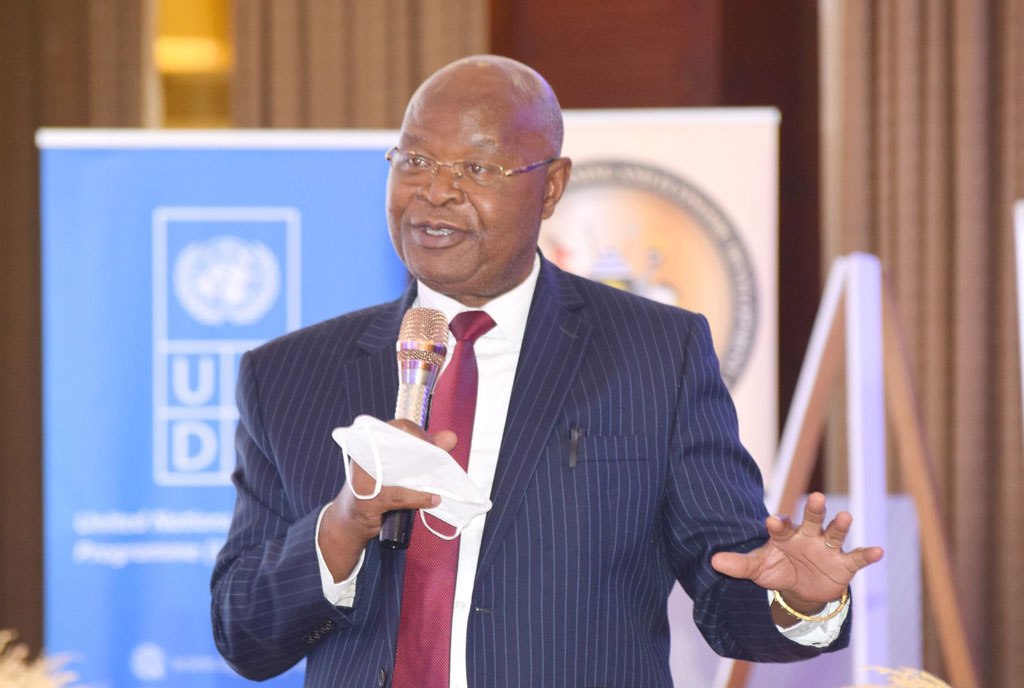UPDF revisits pay claims of 1991 bombing victims

A UPDF officer (left) looks at the scars of Mr Fred Adriko, a victim of the bombing, at Ojapi Primary School, Maracha District, last week. PHOTO | ROBERT ATIKU
What you need to know:
- Lt Col Wilson Bahati, a UPDF officer in Maracha who accompanied the team of investigators to the scene of the bombing, said the purpose of the visit was to ascertain the level of damage caused by the bombardment so as to compensate the victims.
The UPDF 4th Division has sent a team of officers to make a fresh assessment of people who were injured during the aerial bombardment that occurred at Ojapi Primary School in Maracha District in 1991.
Lt Col Wilson Bahati, a UPDF officer in Maracha who accompanied the team of investigators to the scene of the bombing, said the purpose of the visit was to ascertain the level of damage caused by the bombardment so as to compensate the victims.
“We are here to ascertain the incidence which took place when the Sudanese government plane dropped bombs here in the school where teachers and some students were injured,” said Lt Col Bahati at the weekend.
“These people came to establish the number of victims who were injured by that bombing and to confirm how many people died and how many survived,” he added.
Ojapi Primary School (then in Tara Sub-county) now in Ajira Sub-county, Maracha District, was bombed on Friday, September 20, 1991 at 11:45am by war planes from Sudan. The bombardment left two people - Mary Jackson, an expectant mother, and Charles Driwale, a pupil, dead.
Witnesses revealed that there were two planes that released five bombs, three of which landed on the school compound and church premises, and the other two landed on a hill east of the school where a home was destroyed, killing the pregnant woman.
Intentions of the air raid have also remained a mystery to residents.
The survivors under their umbrella body, Ojapi Air Raid Victims Compensation and Rehabilitation Association, have been demanding for compensation from the Ugandan government. To date, they have never been compensated and some have been maimed for life.
The chairperson of the survivors association, Mr Philliam Debo, explained the long process of demanding for compensation.
“The struggle for our compensation started long time ago. It was not until our former Member of Parliament, Mr James Acidri, raised this matter on the flow of Parliament and the responsible minister was tasked to make a statement. So it later prompted the then minister of Justice and Constitutional Affairs to send a team from Chieftaincy of Military Intelligence to come on ground to do assessment,” he said.
He added: “Now this is the second team of military officials to visit us. We, therefore, hope to be compensated because we were bombed when we were innocent.”
Mr Debo said those who were disabled by the bombing need support in form of artificial limbs and crutches.
The military officers interviewed the survivors and recorded the information about the incident.
Appeal
The survivors used the opportunity to urge the government to act fast, arguing that most of the bombing victims are impoverished.
Mr Fred Adriko, a survivor, said: “Since I was injured in this attack, it is hard for me to dig [do farming]. If I dig, I feel a lot of back pain. And when I was in school, to participate in co-curricular activities like football and athletics was hard for me.
The government needs to give us support.”
Mr Adriko was injured by a fragment of the bomb on the back while playing with his siblings at their home located in the eastern neighbourhood of Ojapi Primary School when he was nine months old.
Mr Isaac Azabo, another survivor, whose right leg was amputated due to injuries sustained in the attack, said that he cannot do commercial farming due to his condition.
“I have been struggling to survive for the last 30 years.
My physical condition can’t allow me to engage in commercial farming. My dream of acquiring good education ended the day I was injured in this attack. Government should come to our rescue,” he said
How it happened
Witness account
The then head teacher of Ojapi Primary School, Mr Jimmy Aluma, (whose child was also injured) recounts how the bombing occurred.
“That time, we had just sent pupils back to class after a short break. All of a sudden, we heard the sound of planes approaching. We thought they were passing by but to our surprise, we saw the planes coming lower and lower,” he said.
Mr Aluma added: “Shortly, we just saw bombs landing near the football ground. The school was thrown into confusion with people running up and down. Then we heard pupils crying in the football pitch. One of our pupils was found lying lifeless in the football ground and a dozen others were seriously injured. It was very horrible.”
The victims are hopeful that government will expedite the process of compensating them.
On October 10, 2014, the survivors of the attack under their umbrella body, Ojapi Air Raid Victims Compensation and Rehabilitation Association, wrote to the President, demanding compensation.
The government did not respond until February 2020 when a team from the Chieftaincy of Military Intelligence (CMI) visited the area.



